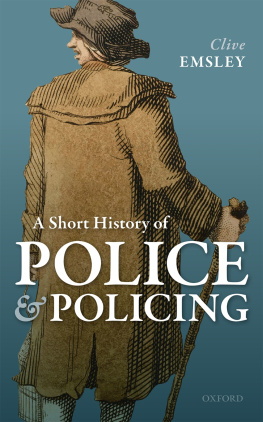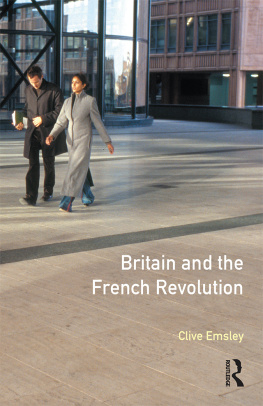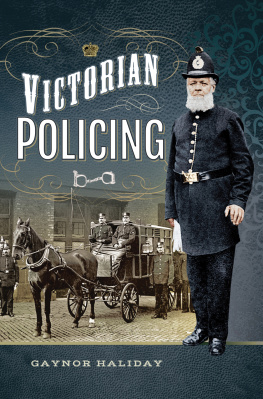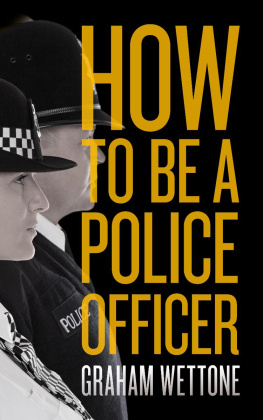Clive Emsley - A Short History of Police and Policing
Here you can read online Clive Emsley - A Short History of Police and Policing full text of the book (entire story) in english for free. Download pdf and epub, get meaning, cover and reviews about this ebook. year: 2020, publisher: OUP Oxford, genre: Politics. Description of the work, (preface) as well as reviews are available. Best literature library LitArk.com created for fans of good reading and offers a wide selection of genres:
Romance novel
Science fiction
Adventure
Detective
Science
History
Home and family
Prose
Art
Politics
Computer
Non-fiction
Religion
Business
Children
Humor
Choose a favorite category and find really read worthwhile books. Enjoy immersion in the world of imagination, feel the emotions of the characters or learn something new for yourself, make an fascinating discovery.
- Book:A Short History of Police and Policing
- Author:
- Publisher:OUP Oxford
- Genre:
- Year:2020
- Rating:3 / 5
- Favourites:Add to favourites
- Your mark:
- 60
- 1
- 2
- 3
- 4
- 5
A Short History of Police and Policing: summary, description and annotation
We offer to read an annotation, description, summary or preface (depends on what the author of the book "A Short History of Police and Policing" wrote himself). If you haven't found the necessary information about the book — write in the comments, we will try to find it.
A Short History of Police and Policing — read online for free the complete book (whole text) full work
Below is the text of the book, divided by pages. System saving the place of the last page read, allows you to conveniently read the book "A Short History of Police and Policing" online for free, without having to search again every time where you left off. Put a bookmark, and you can go to the page where you finished reading at any time.
Font size:
Interval:
Bookmark:


Great Clarendon Street, Oxford, OX2 6DP, United Kingdom
Oxford University Press is a department of the University of Oxford. It furthers the Universitys objective of excellence in research, scholarship, and education by publishing worldwide. Oxford is a registered trade mark of Oxford University Press in the UK and in certain other countries
Clive Emsley 2021
The moral rights of the author have been asserted
First Edition published in 2021
Impression: 1
All rights reserved. No part of this publication may be reproduced, stored in a retrieval system, or transmitted, in any form or by any means, without the prior permission in writing of Oxford University Press, or as expressly permitted by law, by licence or under terms agreed with the appropriate reprographics rights organization. Enquiries concerning reproduction outside the scope of the above should be sent to the Rights Department, Oxford University Press, at the address above
You must not circulate this work in any other form and you must impose this same condition on any acquirer
Published in the United States of America by Oxford University Press
198 Madison Avenue, New York, NY 10016, United States of America
British Library Cataloguing in Publication Data
Data available
Library of Congress Control Number: 2020942286
ISBN 9780198844600
ebook ISBN 9780192583062
Printed and bound in Great Britain by
Clays Ltd, Elcograf S.p.A.
Links to third party websites are provided by Oxford in good faith and for information only. Oxford disclaims any responsibility for the materials contained in any third party website referenced in this work.
For Ren Levy and Rene Levy-Zauberman
Forty years ago I wrote a small book comparing eighteenth- and nineteenth-century policing in England and France. At the time there was little that took an academic or uncritical approach, especially with reference to England, though two young American scholarsnow good friends, Bob Storch and Bill Millerwere doing some interesting and important work. Other friends, no longer around, were also beginning important work that I have found helpful and stimulating, particularly John Beattie, David Philips, Barbara Weinberger, and Pieter Spierenburgthe latter always ready to correct our English and make us relieved that we did not attempt Dutch!
At the Open University I was lucky to have a large number of good friends, colleagues, and students: the late and much lamented David Englander, and still going strong Richard Bessel, Rosalind Crone, David Churchill, Peter King, Paul Lawrence, Gerry Oram, Annika Mombauer, Georgie Sinclair, Jim Whitfield, Chris Williams, and Bob Morris (the Mandarin to end all Mandarins). I find it difficult to forgive certain university administrators for breaking up the police archive that we were putting together. There remains no single point for collecting police archives in England or Britain, in spite of the continuing boasts by politicians, leading police officers, and others about having the best police in the world.
Beyond the Open University I also owe thanks to a large number of police and criminal justice historians to whom I now give a mention and who have always been unstinting with help: Jean-Marc Berlire, Lt-Col. Flavio Carbone, Jonathan Daly, Jonathan Dunnage, Mark Finnane, Richard Hill, Steve Hughes, Anja Johansen, Joanne Klein, Gen. Georges Philippot, Haia Shpayer-Makov, Sanne Muurling, and Jos Smeets.
Anyone who knows my work will know that I have usually dedicated books to my wife. On this occasion, however, I want to include my good friend Ren Levy and his wife Rene, whom I have known for at least forty years. They have given me bed and board as well as listening ears and encouragement. Many thanks for all this. We have watched children and grandchildren grow. We do not share identical ideas as a historian and sociologiststhis is hardly surprising, but it makes for interesting discussions.
When I use a word, Humpty Dumpty said in a rather scornful tone, it means what I choose it to meanneither more nor less.
Lewis Carroll, Alice Through the Looking Glass
It can be argued that most people want a peaceful, quiet life. Most sensible community, civic, or national leaders are keen to provide this. Furthermore, it is difficult to contemplate a society in which some body of individuals are given, either by the community as a whole or by the individual or individuals that have authority, the power to enforce the norms generally held by the members of that society. No one wants to have taken from them what they understand as their personal possessions or their rights, or to suffer personal injury, or to see such injury inflicted upon their immediate kith, kin, or even a friend or neighbour. There can be different ways of resolving such issues. It is difficult, probably impossible, to envisage a society that forbids a victim or his or her representatives from resolving an injury or tort. In many instances, resolution used to involve bloodshed, sometimes leading to a feud. At times, religion or some form of sorcery was employed to discover or injure the perpetrator. When the offender was (or is) known, a victim, or his or her kin, could be permitted to inflict punishment themselveshence the feud. There might also be some kind of enforcers and/or helpers who can bring parties together to settle matters or to bring those accused of doing harm before people with some authority such as elders, community headmen, or magistrates who can impose some sort of sanction without necessarily having any recourse to formal law. Moreover, in significant groupings of people larger than a hunter-gatherer group or a small rural community, the enforcers, even if only ordinary members of the larger community, can be organized into bodies required to provide help or assistance when necessary to maintain the general welfare. In broad terms, that is what policing was in many of its early understandings: a system to enable the well-being of individuals and the growth and welfare of the community. The aim of what follows is to trace the manner in which the enforcers and helpers developed into the institutions now termed police, polizei, polizia, polcia, politsiya, or any one of the other linguistic forms. Separating policing from the institutions known as police helps to warn against a simple linear development of the institution and the assumption that nothing like it existed particularly before the Enlightenment and that it has gradually grown more effective and more responsive to the communitys or the individuals needs.
The word police has its origin in the Classical Greek (politeia), a word that also provided the root for policy and that concerned all matters affecting the survival and welfare of the citythe polis. This raises two assumptions that need to be considered at the outset: first, that the police institution alone is responsible for policing, and, second, that it is easy to set a date for the founding of the institution.
Briefly, and to begin, in the English-speaking world there seems to be an assumption that the institution called the police is primarily concerned with doing policing. Elsewhere there is often no precise link between the police and policing. In French, for example, there is no single verb for policing and the term faire la police (literally translated as to do the police/policing) is commonly used. In German, a variety of words such as
Font size:
Interval:
Bookmark:
Similar books «A Short History of Police and Policing»
Look at similar books to A Short History of Police and Policing. We have selected literature similar in name and meaning in the hope of providing readers with more options to find new, interesting, not yet read works.
Discussion, reviews of the book A Short History of Police and Policing and just readers' own opinions. Leave your comments, write what you think about the work, its meaning or the main characters. Specify what exactly you liked and what you didn't like, and why you think so.






